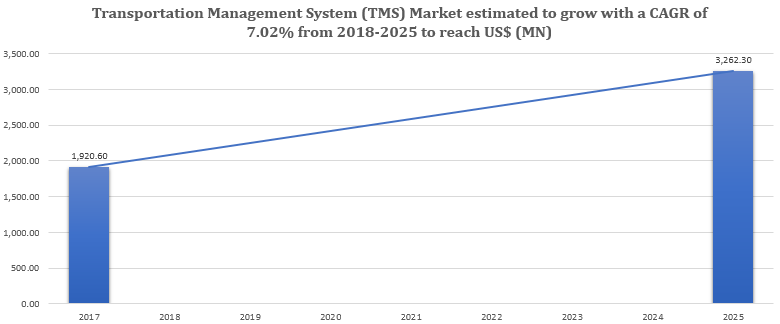Increase in the demand for Transportation Management System (TMS) among E-commerce industries is projected to raise the deployment of software in near future
The global Transportation Management System market accounted for US$ 1,920.6 Mn in 2017 and is expected to grow at a CAGR of 7.02% over the forecast period 2018–2025, to account for US$ 3,262.3 Mn in 2025. Utilization of modern and technologically advance TMS operates dynamically and works on real-time monitoring which gives accurate insight to help in the maximization of routes, modes, deliveries, and customers’ experience. Adoption of TMS in e-commerce help the providers to maximize their gain on customer and profit through accurate and timely delivery of consignment.
The e-commerce industry gathered pace in the early part of this decade with advancements in the internet infrastructures & speed, as well as increasing smartphones and internet penetration among the users. E-commerce sparked an upheaval in the consumers buying behavior and also changed the ways in which businesses interact with each other. As the global e-commerce market is heating up, varying buying patterns and trends have been observed in different countries of the region with regards to the product category preferred for online purchase. Most of the buying is influenced by the demographics of the country such as the percentage of youth population indulging in e-commerce activity, the economy of the country, age group interested in e-commerce, and the level of awareness in the country. The categories the online shoppers most often purchase consist of electronics, apparel, accessories, and perfumes. Groceries, books, CDs, shopping for travel and entertainment are the things that are purchased online by customers globally. Fashion is currently the leading product category in many countries of the world, which is then followed by Electronics & Media.
TMS is a significant component of e-commerce in order to manage the issues of inventory, warehousing, packing, tracking, and shipping. In contrast with retail store, the e-commerce business is accountable for ensuring timely delivery and if the goods or products are returned then the company has to manage all the operations in reverse logistics. In the e-commerce business, TMS provider deliver flexibility & scalability, upgraded technology, and efficiency & specialization. Moreover, the logistics requirement and services provided by the logistics firms to e-commerce business are supply chain management, warehousing, consolidation service, and order fulfillment. There are numerous benefits related to e-commerce and it can get fulfilled if the company outsource their logistics requirements to a third party service provider. This enables the e-commerce participants to perform their specialized roles, thus, it is a reliable alternative to outsource third party organization in the e-commerce ecosystem. TMS firms specialized in supply chain management that allow online stores to emphasize more on marketing and other business operations.
Furthermore, several initiatives to propel the Transportation Management System market has undertaken by varied players. For instance, Kuebix TMS integrated with major e-commerce platforms – BigCommerce and Shopify, in order to help e-commerce companies to make profitable transportation operations, whether shipping via LTL, parcel, or truckload (TL).



